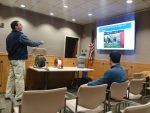Town, Sunshine Home Neighbors Meet Over Water Concerns

Homeowners neighboring the Sunshine Children’s Home were told last week that ongoing well monitoring will determine if the expanded facility negatively impacts their water supplies and whether it would require mitigation.
The town’s consulting hydrogeologist, William Canavan, president of HydroEnvironmental Solutions, Inc., and New Castle Director of Planning Sabrina Charney Hull held an informational forum last Wednesday evening with about 20 residents who live near the Spring Valley Road site in hopes of answering questions and easing concerns about the water issue.
Questions surrounding whether Sunshine’s three on-site wells could support the expansion from 54 to 122 beds and from less than 19,000 square feet to 143,000 square feet has been one of several key topics stemming from the three-year review of the controversial project and now the start of work at the 33-acre property.
The session was scheduled by the town after neighbors requested an update on the project’s well monitoring program, which started last July, one of Sunshine’s conditions for approval that would determine baseline water use. Last May, the town’s Zoning Board of Appeals approved a special permit to allow the project to move forward.
Canavan said with his firm tracking Sunshine’s usage and eight homeowners’ wells being monitored within a 2,500-foot radius, it would be apparent if the facility is responsible for drawing down water in the area’s residential wells.
“Doing what I’ve done as long as I have, I think if there’s a drought you guys have plenty of water here,” Canavan said. “But we’re going to see it, we’re going to monitor it and we’re going to know what’s going on.”
He said there are several mitigation measures that could be imposed should it be determined that Sunshine’s water use is causing shortages in the area’s wells. Options include pumping less water, placing the affected neighbor or neighbors’ off-site water pump deeper into their well, drilling an existing well deeper or drilling a new well.
The town is holding a significant bond that would be used to pay for work if it was proven that Sunshine’s is causing a problem, Hull said.
The town could also revoke Sunshine’s Certificate of Occupancy, she said.
Sunshine is calculating using 99 gallons a day per bed, which accounts for 12,078 of its 15,000-gallon-a-day budget.
“If they’re pumping more than they should be pumping based on the data that (Canavan) is reviewing, and we’re getting phone calls from people who are living in this area that they are having well problems, then we’re going to put two and two together because that data that we have on site, combined with the data that we’re logging in neighboring wells, we’ll have a good sense who is being impacted,” Hull said.
Canavan said during the first six months of monitoring, water levels in the eight wells being examined showed typical patterns of use and recovery.
“Right now, I’m 100 percent confident based on the data I’ve seen on and off site that when they pump their wells with what they’re using, they’re not affecting anybody off site,” Canavan said.
Sunshine representatives have said the home will no longer irrigate its grounds with well water, which accounts for as much as 10,000 gallons of water a day, Hull said. Instead, a system will be installed that collects rainwater in underground tanks and providing what is needed for irrigation.
Residents who spoke at last week’s meeting remained highly skeptical. Glendale Road resident Cynthia Manocherian asked why Sunshine isn’t required to perform a pump test that would mimic their daily water needs once expanded. During the winter the facility has been typically using 4,000 to 5,000 gallons a day but that is almost certain to rise in warm weather.
There is also suspicion because Sunshine provided the town the equivalent of just two years of historical data, rather than the required five years, she said.
“They refused to do a pump test before Sunshine Home was given approvals (which) makes no sense and that they refused to get the complete data together for the off-site wells as well as the on-site wells before giving construction permits. It’s a backwards process,” Manocherian said.
Manocherian’s attorney, Adam Stolorow, who attended the meeting, said the following day that there is concern that Sunshine plans to use collected rainwater not just for irrigation but for firefighting, raising concerns that they would not have enough water on hand to do both.
Combined with an episode over the 2017 Thanksgiving weekend where Sunshine engaged in unauthorized work on one of its wells, distrust has continued to grow.
“Can you understand the concern of the community that we’re having problems getting them under control with the simplest of issues?” said Karen Wells, a Cortlandt resident who is part of a group called the Greater Teatown Defense Alliance, which is fighting Sunshine and the Hudson Wellness Center, a proposed drug rehab just over the border in Cortlandt.
Resident David Valdez echoed a sentiment from neighbors who are having a hard time understanding how a facility like Sunshine that will expand so dramatically won’t have an impact on their environment, including water.
“I just find the scale of what was approved – and it’s already approved – to be breathtaking for a residential community,” he said.

Martin has more than 30 years experience covering local news in Westchester and Putnam counties, including a frequent focus on zoning and planning issues. He has been editor-in-chief of The Examiner since its inception in 2007. Read more from Martin’s editor-author bio here. Read Martin’s archived work here: https://www.theexaminernews.com/author/martin-wilbur2007/
